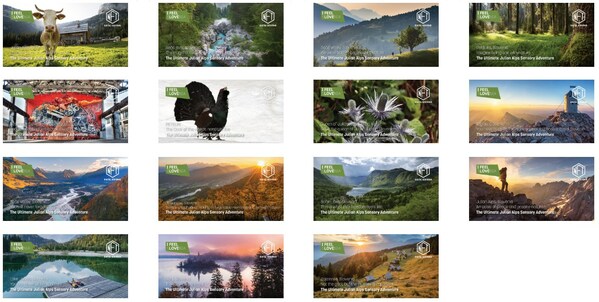
This week marked the end of a three-day event where representatives from 15 media outlets, owners of an exclusive NFT digital souvenir, cashed it in as a ticket to a unique experience in the Julian Alps. The project was created in partnership between the Slovenian Tourist Board (STB) and the Julian Alps.
Between the 29th and 31st of May, holders of the Ultimate Julian Alps Sensory Adventure NFT had an opportunity to experience first-hand the value of NFTs by using them as a ticket to a unique and one-of-a-kind event that combined a digital souvenir and a ticket with an experience in Slovenia. The NFT holders were journalists from international media including the UK, Italy, Germany and Switzerland, as well as from Slovenia and a representative of the Web3 community.
Aljoša Ota, Head of the Italian office of the Slovenian Tourist Board, explained: “By combining a digital souvenir in the form of NFT tokens and the real-life experience, we are approaching the promotion of Slovenia in a creative and innovative way. The project has been developed in partnership with the Julian Alps, which puts sustainability at the core of all its activities. The destination has received numerous prestigious international awards for their efforts and Bohinj is the first destination to receive the highest award of the Slovenian Green Tourism Scheme, the platinum Slovenia Green label.”
The Ultimate Julian Alps Sensory Adventure was a unique event, for which a collection of 15 unique NFTs were released, functioning as an exclusive digital souvenir and also as a ticket to this event. Some of them were awarded to representatives of international media at last year’s WTM in London, and some were given to selected journalists from key Slovenian tourism markets.
The project is the result of an innovative approach to the promotion of Slovenian tourism. By integrating advanced technology, the project highlights the importance of a responsible attitude towards nature by drawing attention to the issue of disappearing plants and animal species in the Julian Alps, such as the Alpine mynah and the wild rooster. The STB and the Julian Alps have thus drawn attention to the fact that the key to steering the future of the planet lies in the awareness of the link between nature and man.
Klemen Langus, Director of Tourism Bohinj, also stressed the importance of such events: “I am pleased that we have brought together new technologies to promote the protected area. It was crucial to enter and protect the area in a different way, so that you don’t even need to see the endangered species, but they resonate in you throughout the whole Ultimate Julian Alps Sensory Adventure.”
During the three-day event, journalists also attended the International Wild Flower Festival. Learning about stories that put the importance of preserving the balance of nature and biodiversity into forefront, the fragility of ecosystems and the importance of finding sustainable solutions and responsible travel and tourism. The sensory experience is also a reminder to take some time off and experience the environment with all your senses. The event also included a special dinner with Michelin-starred chef Uroš Štefelin.
Using new technologies for innovative and effective promotion of Slovenian tourism
By issuing new NFT tokens and redeeming them as a real experience in the Julian Alps, Slovenia once again stands out as a smart, innovative and sustainable destination. NFTs are a form of digital crypto-coins or tokens that, due to their characteristics, are not interchangeable with others and are therefore unique and one-of-a-kind, they can represent a digital work of art, a unique object or a service.
For users, NFT tokens can provide several benefits. If registered on a public blockchain platform, NFTs can serve as proof of attendance at a particular event and can be used as a promotional tool. NFT tokens can become collectors’ items that confer prestige and social value to their owners. Finally, NFT tokens can give access to exclusive services or benefits during a trip, such as discounts on accommodation, restaurants or other tourist activities and exclusive experiences.
The use of blockchain technology maintains international competitiveness at a high level by promoting digitalisation, improving customer satisfaction and raising trust through increased efficiency, transparency and sustainability – values that are the cornerstone of the vision of Slovenian tourism. The use of blockchain technology is also highlighted by the STB in the Digital Transformation Strategy for Slovenian Tourism 2022-2026, where a specific action (Action 9) addresses the concept and functionality of the Green Digital Token. The aim is to increase the value and quality of Slovenia. As well as to increase and modernise the promotional activities of the STB in order to ensure the presentation of Slovenia’s tourism sector in a digital, modern and innovative form.
More broadly, the STB is exploring possible implementations of all the tools currently being developed in the context of Web3, which refers to the third generation of the World Wide Web. Key features of Web3 include the ability to own and control one’s own data, user autonomy and the use of smart contracts for transactions, and the use of web applications and tools that work with artificial intelligence.



 share
share








































